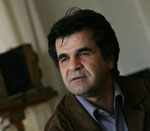 Boston Globe: The title of “This Is Not a Film” is itself a bitter joke on the illogic of totalitarian thinking. The acclaimed Iranian director Jafar Panahi is not allowed to make a film. Therefore, this is not a film.
Boston Globe: The title of “This Is Not a Film” is itself a bitter joke on the illogic of totalitarian thinking. The acclaimed Iranian director Jafar Panahi is not allowed to make a film. Therefore, this is not a film.
Boston Globe
By Ty Burr
 The title of “This Is Not a Film” is itself a bitter joke on the illogic of totalitarian thinking. The acclaimed Iranian director Jafar Panahi has been banned by the state from all filmmaking activities for 20 years and, when we see him in this footage shot in 2011, he’s appealing a six-year prison sentence for “assembling and colluding with the intention to commit crimes against the country’s national security.” He is not allowed to make a film. Therefore, this is not a film.
The title of “This Is Not a Film” is itself a bitter joke on the illogic of totalitarian thinking. The acclaimed Iranian director Jafar Panahi has been banned by the state from all filmmaking activities for 20 years and, when we see him in this footage shot in 2011, he’s appealing a six-year prison sentence for “assembling and colluding with the intention to commit crimes against the country’s national security.” He is not allowed to make a film. Therefore, this is not a film.
What is it, then? One day in the life of a bored and stymied 50-year-old man who can’t leave his house. A deflected plea for the freedom to speak, to create, to live. An attempt to tell the story of the movie the Iranian government won’t let him make. A portrait of an imploding country as seen from a Tehran balcony.
In short, “This Is Not a Film” is the world within an apartment, and it is quietly devastating.
The back story behind the movie is both fascinating and cautionary: Using the documentary filmmaker Mojtaba Mirtahmasb as his cameraman, Panahi shot on high-end digital video and with his iPhone. The resulting documentary was smuggled into last year’s Cannes Film Festival on a flash drive hidden inside a cake, where it was hailed by the world’s assembled directors and actors, many of whom had signed petitions urging Iran’s leaders to free Panahi. In September, Mirtahmasb was denied permission to accompany the film/not-film to the Toronto International Film Festival. A few weeks later, he was arrested on suspicion of being a spy for the BBC.
All this for a 77-minute movie about a mild-mannered director wondering why he’s being hung out to dry. We see Panahi pace his apartment in frustration, talking to Mirtahmasb, to the camera, to us. It’s the Persian New Year, March 2011, and his wife and daughter are away visiting her mother. He feeds his pet iguana and talks a neighbor out of leaving her horrid little dog with him for an hour. The tsunami in Japan is on the news and there are New Year’s bonfires and fireworks in the street. They sound like gunshots.
There’s more to it than that, of course. “This Is Not a Film” may be one of the most eloquent blows against a dictatorship ever filmed because it forces you to think about everything that can’t be said and everything that’s just off-screen. Panahi digs out his most recent banned script and tries to block it out on his living room rug with masking tape. The story’s about an Iranian girl whose parents lock her in the house to prevent her from going to college, and the ironies are unspoken but obvious. He reads the dialogue and takes a stab at acting out the parts. “Acting and reading aren’t an offense, are they?” he asks, only partly in jest.
Yet the attempt collapses in despair. “If we could tell a film,” Panahi wonders aloud, “then why make a film?” He takes a call from his lawyer; the appeal looks iffy. (In October of last year, Panahi’s ban and six-year sentence were confirmed; he remains under house arrest and is trying to take the case to Iran’s Supreme Court.) Night falls and the explosions in the street pick up.
If you’ve seen any of Panahi’s movies — “Crimson Gold” (2003) and “Offside” (2006) are good places to start — you know that they’re about everyday Iranians (women, mostly) struggling with everyday humiliations. They’re hardly blows against the empire, yet a tacit rebellion, a seething discontent with the way things are, imbues each frame. So it is in “This Is Not a Film” — every image carries weight. The last few minutes seem to be a digressive postscript: Mirtahmasb has gone home (leaving instructions that “the camera stay ON”) and Panahi helps his building super’s brother-in-law take the garbage out to the street.
The young man’s a university student working multiple jobs to stay in school; he’s open-hearted, articulate, hopeful, and worried. He’s the future of Iran in a tiny elevator going down. When the two get to the building’s basement entrance, Panahi steps gingerly, illegally, into the night. His camera finds and holds on the fires in the street.


